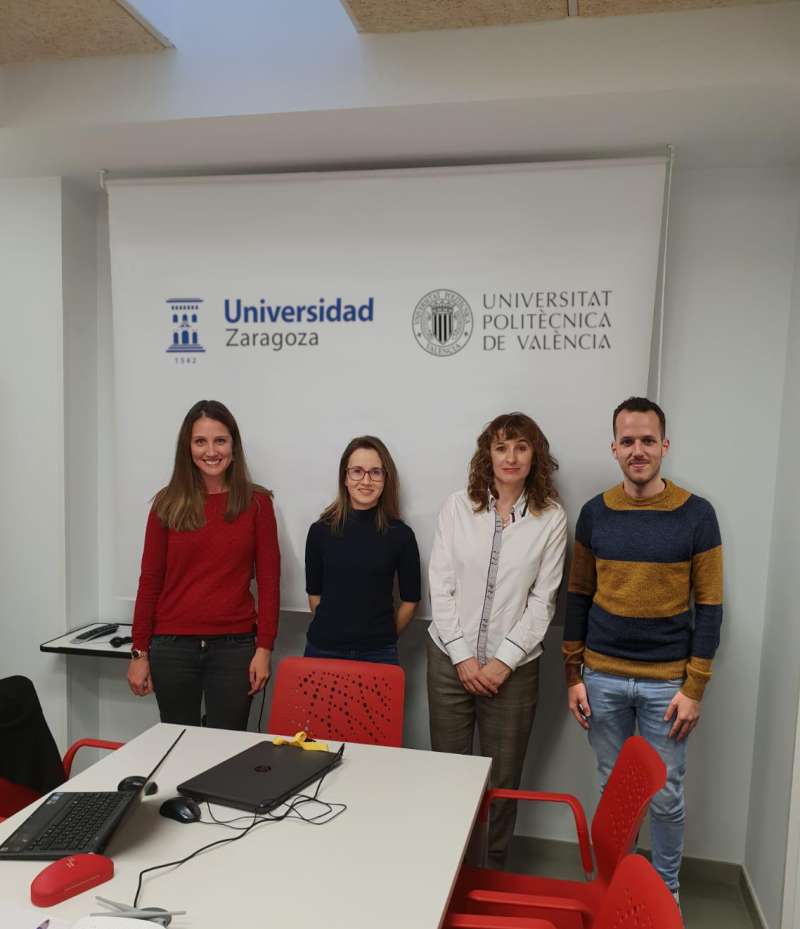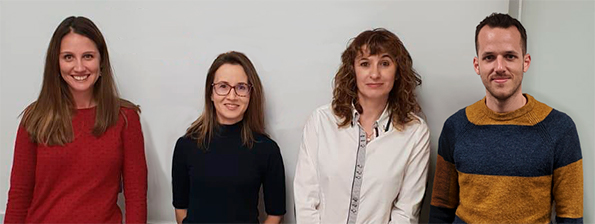The UPV and the UniZar create an augmented reality app to evaluate the spatial memory that could have application in Alzheimer’s patients
A team of researchers from the Universitat Politècnica de València (UPV) and the University of Zaragoza (UniZar) has developed an augmented reality app to evaluate spatial memory.
Among its applications, it could be used with patients of Alzheimer’s as a tool for the analysis and training of skills linked to memory, as long as the patient is not in an advanced stage of the disease.
On the other hand, it could also be of great help in the infant stage, for the early identification of alterations related to spatial memory. The work of researchers from the UPV and UniZar has been published in the IEEE Access journal.

Researchers participanting in the project
An app capable of adapting to the rhythm of the user’s life
Mª Carmen Juan, researcher at the Institute of Automation and Industrial Computing (ai2) of the UPV, explains that short-term spatial memory “is the ability that people have to retain and remember the location of elements for relatively short periods of time, and is the one that influences when remembering where we left the keys, a screwdriver or a pair of glasses, for example “.
The device on which the application is installed recognizes the environment in which it is being used and the place where the objects were left. In addition, it can be taken to the patient’s home to be personalized with the desired objects, which, for Fran Muñoz (ai2-UPV) “represents an enormous advantage, since it adapts to the rhythm of life of each user“.
In the case of using the app for training, it could help physicians evaluate spatial memory through the search for common elements in the daily life of these patients, such as shoes or a hat.
In this regard, Magdalena Méndez López and Camino Fidalgo, researchers from the Department of Psychology and Sociology of the University of Zaragoza, emphasize that the app will improve the current techniques used for memory training “because it allows for memory exercises on where they are left the things in the patient’s home, that is, in the real context where the same difficulties appear, and with minor modifications, the complexity of the exercise can be increased to make it more motivating. ”
The development of this new application also counted on the collaboration of Sergio Albiol, also a researcher at the University of Zaragoza.
The operation of the application, as the sources have explained, assumes that the user enters a room in which there is a series of boxes that include an image inside, which is a “target” of augmented reality and this image, when to be recognized by the application, it shows the virtual element superimposed. “First, the child looks inside some boxes in which different objects appear and then the application asks him to identify the box in which that particular object has appeared,” said Mari Carmen Juan.
This new application consists of a total of seven different levels, each of which incorporates a greater number of boxes and objects that the child who plays with him must remember and identify. Depending on the successes, errors and the level reached by the user, specialists can evaluate the child’s short-term spatial memory. The ARSM application system was validated with a total of 122 children, most of them participating in the Summer School of the Polytechnic University of Valencia.
In 2019, pilot studies with Parkinson’s and Alzheimer’s patients to involve other senses in the evaluation
After the first phase of the research, in which the application has been evaluated in 55 people, during the next months will be carried out two other pilot studies with Parkinson’s and Alzheimer’s patients, respectively.
“The following phases,” concludes Mª Carmen Juan, “will value going beyond the possibilities of the applications developed so far and involving other senses, such as hearing and touch, to assess spatial memory.”
The development of this app is part of the AR3Senses project, funded by the Ministry of Economy and Competitiveness of the Spanish government and co-financed with FEDER funds. In AR3Senses they have developed an augmented reality app based on SLAM to evaluate spatial memory.
